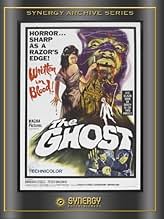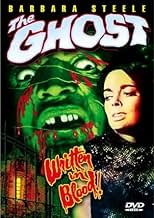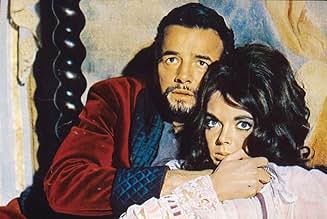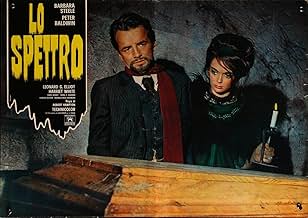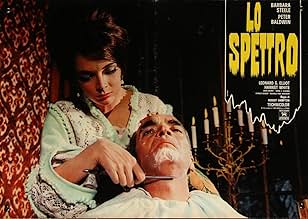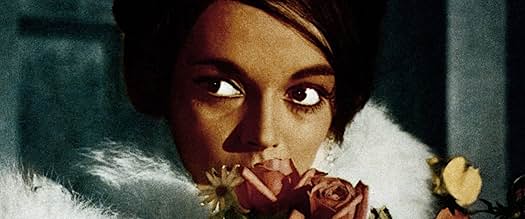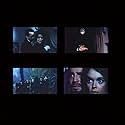NOTE IMDb
6,1/10
1,5 k
MA NOTE
Une femme, avec la complicité de son amant, tue son mari. Cependant, des événements étranges commencent à se produire et ils se demandent s'ils l'ont vraiment tué ou s'il revient d'entre les... Tout lireUne femme, avec la complicité de son amant, tue son mari. Cependant, des événements étranges commencent à se produire et ils se demandent s'ils l'ont vraiment tué ou s'il revient d'entre les morts pour les hanter.Une femme, avec la complicité de son amant, tue son mari. Cependant, des événements étranges commencent à se produire et ils se demandent s'ils l'ont vraiment tué ou s'il revient d'entre les morts pour les hanter.
- Réalisation
- Scénario
- Casting principal
Elio Jotta
- Dr. John Hichcock
- (as Leonard G. Elliot)
Harriet Medin
- Catherine Wood - Housekeeper
- (as Harriet White)
Carlo Kechler
- Police Superintendent
- (as Charles Kechler)
Umberto Raho
- Canon Owens
- (as Raoul H. Newman)
Avis à la une
Riccardo Freda's "Lo Spettro" aka. "The Ghost" of 1963 is yet another delightfully uncanny Italian Gothic Horror film starring the wonderful Barbara Steele (my favorite actress), and while it cannot possibly compare to the absolute highlights in Steele's career, such as Mario Bava's masterpiece "La Maschera Del Demonio" ("Black Sunday", 1960), Roger Corman's "Pit and the Pendulum" (1961, also starring the great Vincent Price) or Antonio Margheriti's "Danza Macabra" ("Castle of Blood", 1964), this is another mesmerizing experience that no lover of Gothic greatness can afford to miss. "Lo Spettro" is a sequel to Freda's earlier Gothic Horror film, "L'Orribile Segreto Del Dr. Hichcock" ("The Horrible Dr. Hitchcock", 1962; they obviously left out a "t" in order to avoid legal difficulties), also starring Steele, which I haven't yet seen. Her character is named 'Margaret' in this film whereas the name was 'Cynthia' in "Dr. Hichcock. This film doesn't require having seen "Dr. Hichcock" , however.
Scotland, 1910: The brilliant, but critically ill, wheelchair-bound Dr. Hichcock (Elio Jotta), who needs to take lots of medications against his mysterious disease, is working on a serum to cure paralysis. His beautiful young wife Margaret (Barbara Steele) is having an affair with his assistant/colleague Dr. Livingstone (Peter Baldwin), however, and the two do not intend to wait for the old Doctor to pass away by natural reasons. Shortly after his funeral, creepy things begin to happen in the uncanny mansion...
As mentioned above, the ravishing Barbara Steele, is my favorite actress, and she is once again great here. In my humble opinion, no other actress was ever capable of blending incomparable beauty with a genius for the uncanny as it is the case with this unchallenged Goddess of Gothic Horror, and no other actress ever will. Under the solid direction of Riccardo Freda, Miss Steele plays yet another typical role with typical greatness. As the credited director of the first (post-WW2) Italian Horror film, "I Vampiri" of 1957, Freda deserves praise as one of the pioneers of Italian Horror, though it must be said that it was actually the great Mario Bava (my choice for the greatest Horror director of all-time) who completed that gem and who is arguably responsible for its greatness. Besides our beloved Barbara, the rest of the cast is also very good, especially Elio Jotta is great as the sinister Dr. Hichcock. William Baldwin is good enough as Dr. Livingstone, as is Harriet Medin as the housekeeper, and the cast furthermore includes Umberto Raho, whom Italian Horror fans might recognize as a regular supporting actor in many films (including Margheriti's "Castle of Blood", Bava's "Baron Blood" and Ubaldo Ragona's "The Last Man on Earth" starring Vincent Price).
The film is almost entirely set inside Dr. Hichcocks eerie, castle-like mansion, which is a terrific setting for old-fashioned Goth-Horror indeed. Franco Mannino's score, which mainly consists of an eerily beautiful theme that is replayed throughout the film, greatly increases the film's rich atmosphere. Overall, "Lo Spettro" is not one of the greatest films in Barbara Steele's filmography, but it still is a very good and creepy Gothic Horror film that none of her fans could possibly afford to miss. Barbara Steele is once again stunningly beautiful, and brilliantly sinister - I simply cannot find enough words to adequately praise this wonderful lady. Barbara, we worship you!
Scotland, 1910: The brilliant, but critically ill, wheelchair-bound Dr. Hichcock (Elio Jotta), who needs to take lots of medications against his mysterious disease, is working on a serum to cure paralysis. His beautiful young wife Margaret (Barbara Steele) is having an affair with his assistant/colleague Dr. Livingstone (Peter Baldwin), however, and the two do not intend to wait for the old Doctor to pass away by natural reasons. Shortly after his funeral, creepy things begin to happen in the uncanny mansion...
As mentioned above, the ravishing Barbara Steele, is my favorite actress, and she is once again great here. In my humble opinion, no other actress was ever capable of blending incomparable beauty with a genius for the uncanny as it is the case with this unchallenged Goddess of Gothic Horror, and no other actress ever will. Under the solid direction of Riccardo Freda, Miss Steele plays yet another typical role with typical greatness. As the credited director of the first (post-WW2) Italian Horror film, "I Vampiri" of 1957, Freda deserves praise as one of the pioneers of Italian Horror, though it must be said that it was actually the great Mario Bava (my choice for the greatest Horror director of all-time) who completed that gem and who is arguably responsible for its greatness. Besides our beloved Barbara, the rest of the cast is also very good, especially Elio Jotta is great as the sinister Dr. Hichcock. William Baldwin is good enough as Dr. Livingstone, as is Harriet Medin as the housekeeper, and the cast furthermore includes Umberto Raho, whom Italian Horror fans might recognize as a regular supporting actor in many films (including Margheriti's "Castle of Blood", Bava's "Baron Blood" and Ubaldo Ragona's "The Last Man on Earth" starring Vincent Price).
The film is almost entirely set inside Dr. Hichcocks eerie, castle-like mansion, which is a terrific setting for old-fashioned Goth-Horror indeed. Franco Mannino's score, which mainly consists of an eerily beautiful theme that is replayed throughout the film, greatly increases the film's rich atmosphere. Overall, "Lo Spettro" is not one of the greatest films in Barbara Steele's filmography, but it still is a very good and creepy Gothic Horror film that none of her fans could possibly afford to miss. Barbara Steele is once again stunningly beautiful, and brilliantly sinister - I simply cannot find enough words to adequately praise this wonderful lady. Barbara, we worship you!
I remember getting my drivers' license. It allowed me to travel to towns a few miles from mine and see movies (only one was shown at a time in those days) at small local theaters. In the sixties we had Vincent Price, Peter Lorre, Sebastian Cabot, and others entertaining us with lightweight, scary little films. Many were based loosely on the works of Poe. Though I never saw this until a few minutes ago, it fits in with that genre. It has wonderful atmosphere. The heroine is not blameless, but has a case for murdering the old meany. Of course, she's going to pay a price, as is her doctor lover, when the old guy comes back to haunt her. There's a little Rebecca and Gaslight here, but it all works nicely to a satisfying conclusion. He who laughs last, of course. The performances are good and the atmosphere of the castle and its bleak goings on is a lot of fun. There is an intensity at work here that build, till people become paranoid and suspicious. See this. It's not a bad ghost story.
Set in Scotland in the early 1900's, this very welcome sort-of-sequel to THE HORRIBLE DR. HICHCOCK (1962) concerns the sickly, wheelchair-bound Dr. John Hichcock (Elio Jotta), whose death is hurried along by his beautiful younger wife Margaret (Barbara Steele) and her handsome doctor/lover (Peter Baldwin), in whose care Dr. H had unwisely entrusted. They poison him and then can't seem to find the fortune that should have been stashed in his safe. While they search the grounds, under the watchful eye of the loyal housekeeper (Harriet White Medin), hubby's ghost seemingly returns to settle the score, driving the two of them to paranoia, madness and murder.
The routine storyline is given a boost by solid direction, atmospheric photography and, especially, a good cast. Though the dubbing is a bit sketchy at times, this is a must for Barbara Steele fans. She's impressively evil in her role and gets a lot of screen time. The twist ending is great and is worth waiting for, as well.
Score: 6 out of 10
The routine storyline is given a boost by solid direction, atmospheric photography and, especially, a good cast. Though the dubbing is a bit sketchy at times, this is a must for Barbara Steele fans. She's impressively evil in her role and gets a lot of screen time. The twist ending is great and is worth waiting for, as well.
Score: 6 out of 10
Barbara Steele is great as the conniving wife of Dr. Hitchcock in this, Freda's sequel to The Horrible Dr. Hitchcock. She conspires with Dr. Hitchcock's physician (who is also her lover) to do away with her old, sick and wealthy husband, which leads to the old revenge-from-beyond-the-grave storyline. While clichéd and (mostly) predictable, this film remains a must-see for fans of atmospheric horror and, in particular, Italian horror films of the 1960's. Riccardo Freda's excellent work combining lighting, sound and camera movement creates an eerie and foreboding atmosphere which overcomes the films weaknesses and gives healthy punctuation to the films shocks. This movie is well worth tracking down, and is certainly deserving of wider recognition than it has thus far received.
I recently watched this film, which was part of a 10 pack horror collection that was put out by Brentwood. Unfortunately the source print for this dvd was a print that was in terrible condition, and barely watchable.
The first thing that struck me about this film was the music. Even during the opening credits I was watching the credits carefully to see who the composer was, half expecting it to be Ennio Morricone, (which it wasn't). If the music wasn't enough to hook me completely, seeing Barbara Steele on the screen, whom I immediately recalled from "Black Sabbath" definitely made me want to continue watching this film, bad print and all.
The setting of this film is a gloomy Scottish mansion, around the turn of the century. The young wife (Steele) of the creepy, crippled and rich Dr. Hitchcock, conspires with her handsome lover, to murder her husband. Her lover happens to be her husbands physician who is treating him by administering a lethal poison which is immediately followed with the antidote. Needless to say they decide not to administer the second part of the treatment one day and are able to fulfill their burning desire to be together, happy ,rich and rid of the husband. Unfortunately for them, things don't quite work out so well, and things begin to unravel during a succession of supernatural events that take place after the murder.
While this is a fairly predictable plot of greedy people being punished from beyond the grave, the director manages to create a suspenseful and atmospheric film, with some occasional well placed shockers. I thoroughly enjoyed this film and would love to see an uncut well preserved print of it.
The first thing that struck me about this film was the music. Even during the opening credits I was watching the credits carefully to see who the composer was, half expecting it to be Ennio Morricone, (which it wasn't). If the music wasn't enough to hook me completely, seeing Barbara Steele on the screen, whom I immediately recalled from "Black Sabbath" definitely made me want to continue watching this film, bad print and all.
The setting of this film is a gloomy Scottish mansion, around the turn of the century. The young wife (Steele) of the creepy, crippled and rich Dr. Hitchcock, conspires with her handsome lover, to murder her husband. Her lover happens to be her husbands physician who is treating him by administering a lethal poison which is immediately followed with the antidote. Needless to say they decide not to administer the second part of the treatment one day and are able to fulfill their burning desire to be together, happy ,rich and rid of the husband. Unfortunately for them, things don't quite work out so well, and things begin to unravel during a succession of supernatural events that take place after the murder.
While this is a fairly predictable plot of greedy people being punished from beyond the grave, the director manages to create a suspenseful and atmospheric film, with some occasional well placed shockers. I thoroughly enjoyed this film and would love to see an uncut well preserved print of it.
Le saviez-vous
- AnecdotesMade during the pseudonym craze of the 1960s, the music score was credited to "Franck Wallace." Italian composers usually registered their pseudonyms with their performing right society, the SIAE, and the identities were listed by Bianco e Nero and the Monthly Film Bulletin who both reported that Wallace was Franco Mannino. However, some reference sources such as Donald C. Willis in 1972 suggested "Franck Wallace" was a joint pseudonym for Mannino and Roman Vlad (the two composers sometimes collaborated and Wallace is a very rough transliteration of Vlad). Even more confusingly, Beat Records released the soundtrack in 2008 and discovered that the surviving tapes in the Nazionalmusic vaults were attributed to Francesco De Masi. So the CD went out credited to De Masi only. De Masi did not work with either of the other two composers, instead being asked at the behest of the director to do a new score, not liking Mannino's effort; what portions thereof are contained in the film, are unknown, as the director seemingly changed his mind again, as Mannino is credited in the film for the score.
- GaffesWhen Dr. Livingston removes the bullet from the wall, there is a close-up of him holding an entire cartridge in his hands.
- Citations
Dr. John Hichcock: [hands around Margaret's throat] Feel how strong my grip is? But I won't kill you.
- ConnexionsFeatured in 100 Years of Horror: Ghosts (1996)
Meilleurs choix
Connectez-vous pour évaluer et suivre la liste de favoris afin de recevoir des recommandations personnalisées
- How long is The Ghost?Alimenté par Alexa
Détails
- Durée1 heure 37 minutes
- Mixage
- Rapport de forme
- 1.85 : 1
Contribuer à cette page
Suggérer une modification ou ajouter du contenu manquant

Lacune principale
By what name was Le Spectre du professeur Hichcock (1963) officially released in India in English?
Répondre
